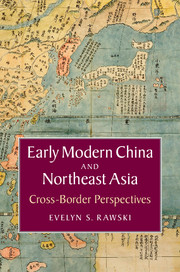Book contents
- Frontmatter
- Contents
- List of maps and tables
- Acknowledgements
- Note on transcription and other conventions
- Map
- Introduction
- Part I China in regional and world history
- 1 The northeast frontier in Chinese history
- 2 Transformations in early modern northeast Asia
- Part II Cultural negotiations
- Conclusion
- Epilogue: drawing boundaries in northeast Asia
- Bibliography
- Index
2 - Transformations in early modern northeast Asia
from Part I - China in regional and world history
Published online by Cambridge University Press: 05 June 2015
- Frontmatter
- Contents
- List of maps and tables
- Acknowledgements
- Note on transcription and other conventions
- Map
- Introduction
- Part I China in regional and world history
- 1 The northeast frontier in Chinese history
- 2 Transformations in early modern northeast Asia
- Part II Cultural negotiations
- Conclusion
- Epilogue: drawing boundaries in northeast Asia
- Bibliography
- Index
Summary
The second half of the sixteenth century found the Portuguese cruising in waters off the coasts of Asia, the Spanish colonizing the Philippines, and Jesuit and Dominican missionaries evangelizing in Japan and China. How did these newcomers affect the maritime and coastal frontiers discussed in the last chapter? More specifically, was the European advent linked to regime change in Japan and China? In contrast to earlier accounts, which place the Tokugawa shogunate and the Qing conquest within separate national histories, this chapter demonstrates the importance of regional interaction in shaping these seemingly independent events. Additionally, it shows how introduction of a world history context that the national histories ignore advances our understanding of the dynastic transition in China, the reunification of Japan, and Korea's traumatic experience of three invasions.
We begin with the 1592 invasion of Korea by Toyotomi Hideyoshi, the culminating event of his successful military career, and the Ming military intervention that stymied Hideyoshi's initiative. Several decades later, another tripartite confrontation of forces involved the Ming, Chosŏn, and a new northeast regional power who would go on to conquer and rule China as the Qing empire. The chapter surveys the Jurchen origins of the Qing ruling house, traces its expanding influence, and chronicles its shifting relations with the Ming and the Chosŏn state. Initially regarded by the Ming and Koreans as mobile marauders on the northeast Asian frontier, the Jianzhou Jurchen successfully created a military force that eventually bested both regimes. Their story presents many elements familiar from the history of earlier conquest dynasties, but with a twist – the new opportunities for wealth accumulation provided by the expanding maritime frontier.
Activities on the maritime frontier and the land frontier in Siberia stimulated political, cultural, and economic transformations in China, Japan and Korea that make the 1550–1650 period “early modern.” The European impact extended far beyond the introduction of improved firearms.
- Type
- Chapter
- Information
- Early Modern China and Northeast AsiaCross-Border Perspectives, pp. 62 - 102Publisher: Cambridge University PressPrint publication year: 2015
- 1
- Cited by



